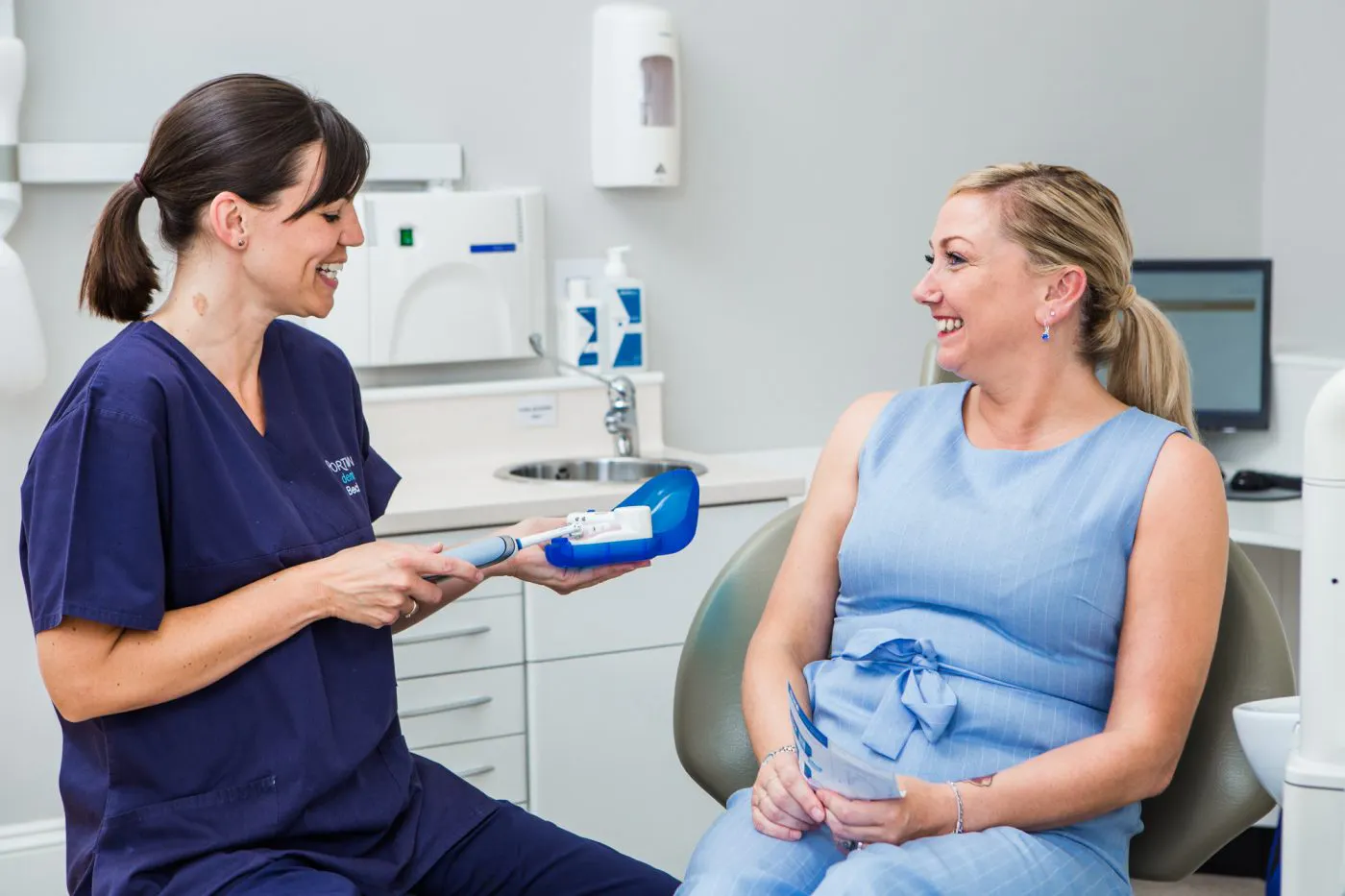Periodontics (Gum Disease)
Gum disease is the leading cause of tooth loss in adults. Periodontal or gum therapy treats the different diseases that affect the gum and bone surrounding your teeth.
Gum disease is silent, so it’s important to get a professional to check for signs regularly. As with any disease, if caught early it is much easier treat, with better results.
- Gingivitis - fairly superficial inflammation of the gums with redness, swelling and increased tendency to bleeding on brushing.
- Periodontitis - deeper inflammation of the gums with loss of some of the bone supporting a tooth. As this progresses the tooth may loosen and perhaps eventually need to be removed. The gums may recede as bone is lost or the gum may come away from the tooth creating a 'pocket'. The progression of periodontal disease is extremely variable - a small amount of supporting bone may be lost over a period of many years in mild forms of the disease; with severe forms rapid breakdown of the supporting structures can occur.
Who gets Periodontal Disease?
All ages can be affected by periodontal disease but chronic periodontitis normally only affects adults. The most common cause, though not the whole story, is inadequate oral hygiene. This results is the accumulation of plaque around teeth and allows the initiation or progression of periodontal disease. If plaque is left on the surface of the tooth for some time, it can start to mineralise and form calculus ('tartar') - this is a hard material and cannot be easily brushed off, but bacteria are still present within it and can cause continued inflammation. There would appear to be some genetic susceptibility to periodontal disease - some people seem much more prone to the condition whereas others are very resistant. Other factors which can increase the risk of disease include:
- Smoking - smokers have been shown to have higher levels of periodontal disease than non-smokers and the tissues do not respond as well to treatment.
- Diabetes and some other systemic diseases which can reduce the body's resistance to bacteria. Especially uncontrolled diabetes can lead to increased severity of periodontal disease. Based on the literature improving the gum condition might improve the control of glucose levels and vice-versa.
- Genetics
- Hormonal changes - in pregnancy or associated with oral contraceptives.
- Some medicines can cause an increased tendency for the gums to swell.
- Tooth anatomy - localised areas which may trap plaque and are difficult to keep clean.
- Stress - Scientific evidence suggests that stress can be associated with rapidly progressive bone loss and aggressive periodontal disease.
- Other factors such as obesity and grinding of the teeth have been identified as risk indicators of periodontal disease. Unfortunately the available evidence can be inconclusive.
Why do I need to see a Periodontist?
If you have been asked to see a Periodontist, this is because it is felt your particular gum problem needs the attention of an expert. He is the best person to make an accurate assessment of the level of disease in your mouth, discuss the most appropriate treatment and either carry out the treatment himself or make a treatment plan for the dental hygienist to follow. Contact Stradbrook Implants in Tonbridge, Kent, to see a professional periodontist.
Do I need to see a periodontist?
Gum disease can be hard to spot, which is why it is important to visit your local Bristol dentist for routine check ups. Your dental practitioner may refer you to a periodontist if they suspect any signs of gingivitis or periodontitis. If you have not seen a dentist for some time, and you think you may have gum disease, book an appointment to see your Stradbrook Implant Clinic dentist straight away on 01732 770666.
Gum disease is serious, affecting the whole of your mouth and ultimately the structure of your jaw. If left untreated can result in bone loss – undermining the foundations of your teeth. Bone and tissue keep your teeth in place, and lasting damage to these ultimately results in loss of teeth and unsightly gaps.
You may have gum disease if:
- Your gums bleed when you brush.
- Your teeth look or feel like they are moving.
- Your gums are red or swollen.
- You suffer from persistent bad breath.
- Your teeth are looking longer (a sign that your gums are receding).
- There are spaces developing between your teeth.
- You experience recurrent mouth infections or ulcers.
Can I get dental implants?
If you have lost a tooth due to gum disease, from an accident or any other reason, you may want to consider a dental implant. This is an artificial tooth root that is placed in the jaw by your periodontist in order to anchor a bridge or an artificial tooth. If you feel that you would benefit from dental implants, speak to your Portman dentist. They can help and advise on the best course of action. You must ensure that you already have a good oral hygiene routine in place, and your Stradbrook Implant Clinic dentist will examine your jaw to ascertain that there is enough bone to attach the implant to.
Where can I find the most experienced periodontists?
At Stradbrook Implant Clinic we have some of the most highly acclaimed periodontists in the country, many of whom lecture internationally. Should you have any concerns over your gums, or think you may have symptoms of gum disease, you can relax in the knowledge that you can be treated in Bristol by some of the most specialised clinicians in the field.



